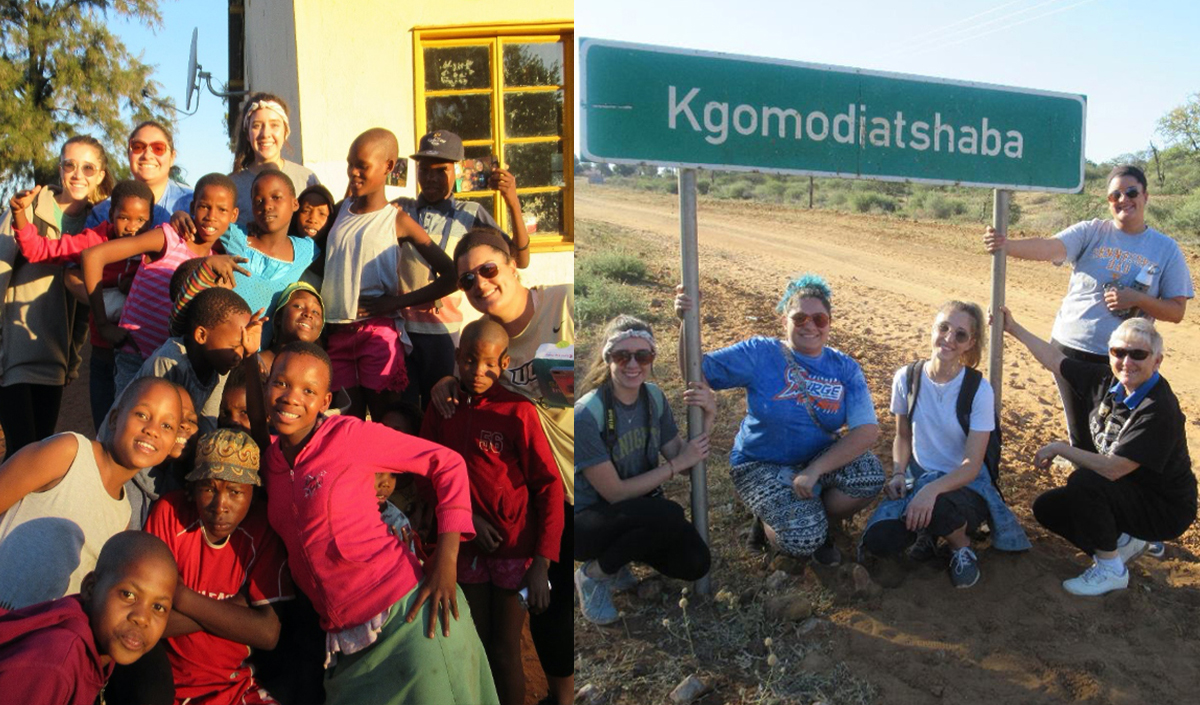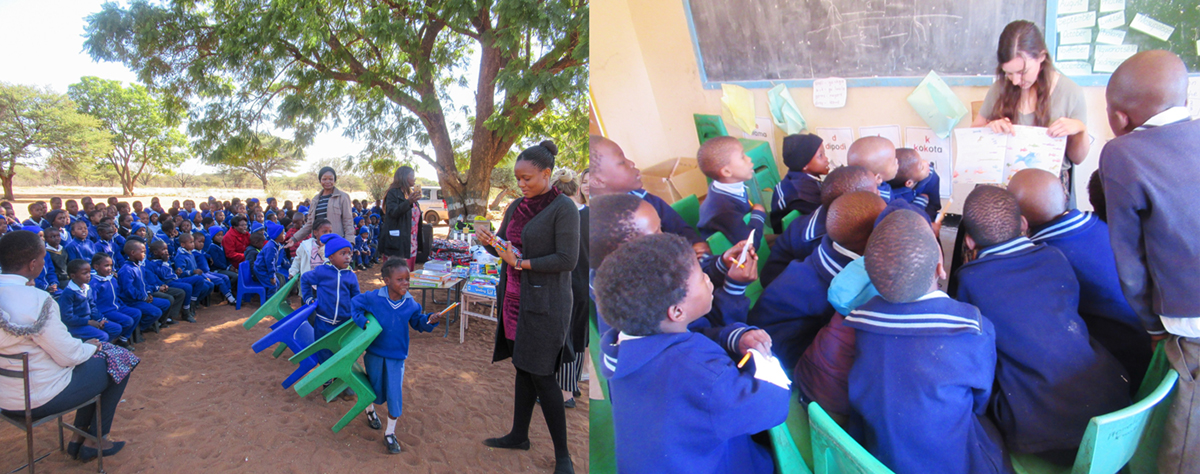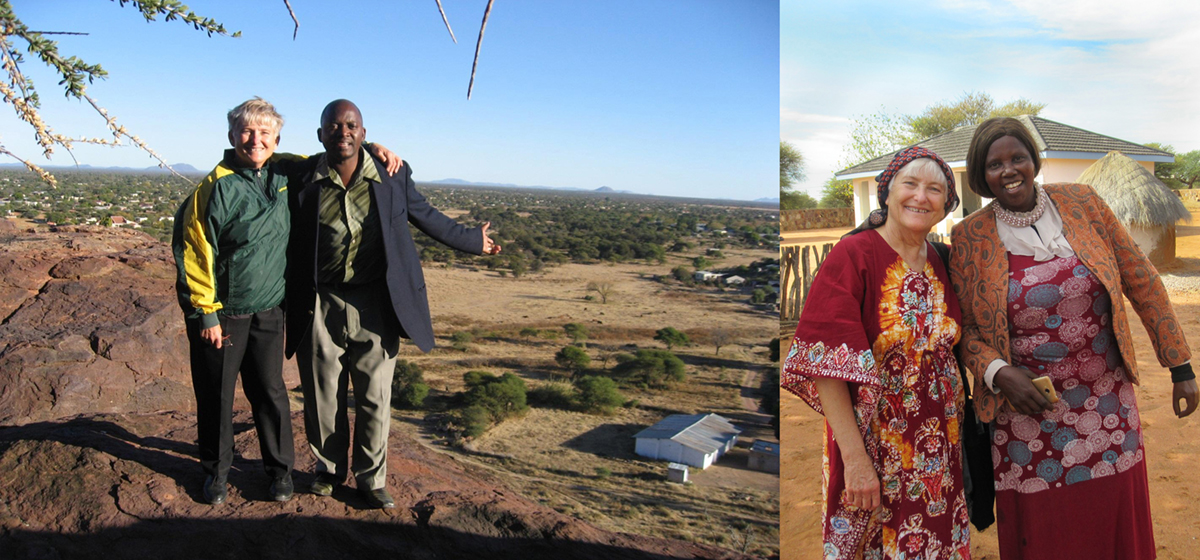After more than 50 years of research and teaching abroad, Professor Karen Biraimah guides UCF's global engagement in new role.

10 Years in Botswana
Karen Biraimah, a UCF professor of curriculum and instruction, has traveled to Africa for more than 50 years to explore how issues related to race, ethnicity, class and gender impact educational equity around the world.
She first taught on the continent through the Peace Corps in Ghana, and since that time has worked in Kenya, South Africa, Namibia, Nigeria and other countries. But over the last decade, Biraimah has focused much of her work in Botswana.
Botswana is considered one of the most progressive, stable and thriving democracies in sub-Saharan Africa, says Biraimah, with a mix of rural and urban communities. It is also home to three national parks and seven game reserves that stretch over 17% of the country, where you’ll find elephants, rhinos, hippos and giraffes. “Botswana has a rich culture, welcoming people and a strong democratic system that was in place long before colonization.”

Improving Africa-Area Studies Curriculum in Florida’s Classrooms
In 2017, Biraimah was named principal investigator and program director for the Fulbright-Hays program to Botswana and Namibia. According to Biraimah, Namibia also has a strong and stable democracy, and like Botswana, borders South Africa. But the two differ when it comes to their histories of decolonization, which have impacted their educational systems.
These characteristics made the two countries ideal locations for Fulbright-Hays participants (K-12 teachers from Orange, Leon and Gadsden school districts and faculty members from UCF and Florida A&M University) to learn about the diverse histories and cultures that exist within Africa. By deepening their understanding of each unique country, participants were better prepared to develop improved curricula for Africa-area studies in the United States.

Fulbright-Hays awards fund scholars whose projects are aimed at developing curriculum with a more international perspective. For this project, participants looked at the impact of history, politics, decolonization and culture on educational outcomes.
Biraimah says participants learned about the two countries over the previous six-month orientation. Once they arrived in each country, faculty members and students from the University of Botswana and the University of Namibia built on that understanding with their own insights. Participants also visited cultural heritage sites and continued their study of Tswana (the national language in Botswana) and Oshiwambo (the most common national language in Namibia). In addition, they traveled to government schools in rural and urban communities, where many of Botswana and Namibia’s most marginalized K-12 students receive their education.
Both educational systems developed principles focused on nation building and social equity, says Biraimah. But children in Botswana and Namibia’s government schools still face barriers. In rural schools in Botswana, for instance, language presents a particular challenge. The first language of a child in these rural schools is often that of their ethnic group(s) and not Tswana, the language used to teach children in early grades. And even if a child learns Tswana, teachers in the rural schools switch lessons to English by the third grade, making it difficult to learn content. Biraimah says this experience gave participants a greater understanding of English-language learners in their Florida classrooms.
With an enhanced appreciation for the rich diversity and uniqueness of African countries and communities, participants were able to develop and share improved curriculum and instructional models on Africa-area studies for Florida’s K-20 classrooms.
“The lasting effect on educators in these experiences, the lesson they most remember once the souvenirs break and they forget the few words they've learned, is to be more critical of the content and materials they use with any students, in the United States or abroad.”
Building Sustainable and Equitable Global Partnerships

Prior to 2017, Biraimah was appointed principal investigator and program director for another Fulbright-Hays award in Botswana. The program offered education majors hands-on experience in rural Botswana schools, developing and implementing curriculum tailored to the lived experiences of the children. She was also appointed principal investigator and program director of a three-year U.S. Department of State grant to develop a sustainable study abroad program in Botswana.
Biraimah has also led the UCF Study Abroad in Botswana since 2012, which while on pause due to the COVID-19 pandemic, will resume once travel is allowed. As part of the program, UCF students learn about the geography, history, languages and cultures for a semester prior to traveling to Botswana. When they arrive, UCF students explore cultural and geographical sites, meet with University of Botswana faculty members, and then travel to remote rural schools where they assist local teachers.
While in the rural schools, UCF students often find that the textbooks refer to references that are irrelevant to the children’s own lived experience, says Biraimah. "I love to walk into a classroom and see UCF students reworking textbook examples to make lessons more relevant. For example, I have seen a writing prompt in Botswana curriculum for an English essay about a day at the beach. Botswana is a landlocked country, so most of the children in these rural schools are not familiar with beaches. In instances like these, UCF students have replaced these examples with more familiar ones, like cattle posts or goats.”

Biraimah says while these experiences involve sharing cultures, she makes clear that UCF students and faculty come to learn and not to tell Botswana how to improve its educational system. “My colleague, Professor Jotia at University of Botswana, likes to say, ‘If you are coming here to save us, please don’t. We can save ourselves. But if you’d like to help work and learn with us, we would be more than happy to welcome you.’”
One major area of research for Biraimah is her focus on building sustainable and equitable educational partnerships between the Global South (comprised of 'emerging nations' such as Botswana) and the Global North (comprised of 'developed nations' such as the United States).
She says there is often a power imbalance within a Global North-South partnership, and “we want to design programs that are not only more beneficial to the host institutions and communities but include them as meaningful stakeholders.” She says this can provide an effective framework of learning experiences for all involved.
Study abroad and Fulbright-Hays participants return from these experiences with perspectives that open up a wider range of opportunities, says Biraimah. “I met up with one Fulbright-Hays participant at a national conference. She was about to return to Uzbekistan where she works on educational development programs with a non-governmental organization. Some participants joined the Peace Corps or teach overseas in other capacities, while others return to the United States and teach from a more global perspective.”
Wherever they end up, Biraimah says participants tend to develop a heightened sensitivity to diverse cultural experiences. “You begin to recognize a student who is trying to navigate somebody else's game to survive, and you can adjust your instruction or curriculum based on their needs.”
Biraimah Guides UCF’s Global Engagement in New Role

With Biraimah’s extensive international experience, multiple Fulbright-Hays appointments and work with the Fulbright Scholar program, she now has a joint appointment with UCF Global.
As of February this year, Biraimah spends half her time with UCF Global to strengthen its internationalization efforts and deeper global engagement. Her role with UCF Global includes advising on the Fulbright-Hays and Fulbright U.S. Scholar programs, globalization of curriculum, faculty support for international students, and identifying and developing competitive international grants.
Biraimah says she remains focused on the expansion of equitable global citizenship. “We enhance our own knowledge base and understanding of others through cultural immersion, both at home and abroad. Our differences are our strengths, and I look forward to building more opportunities to enrich these diverse and globalized connections.”